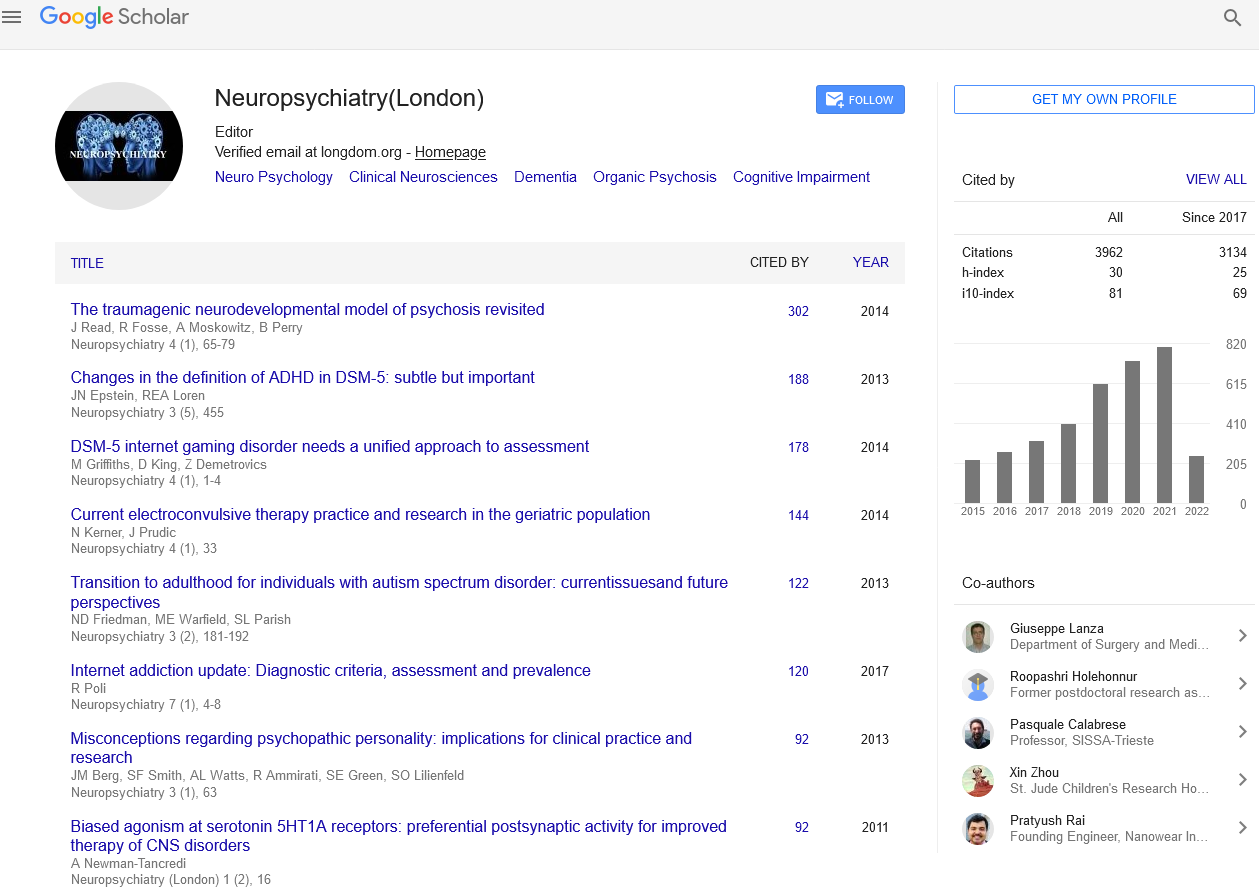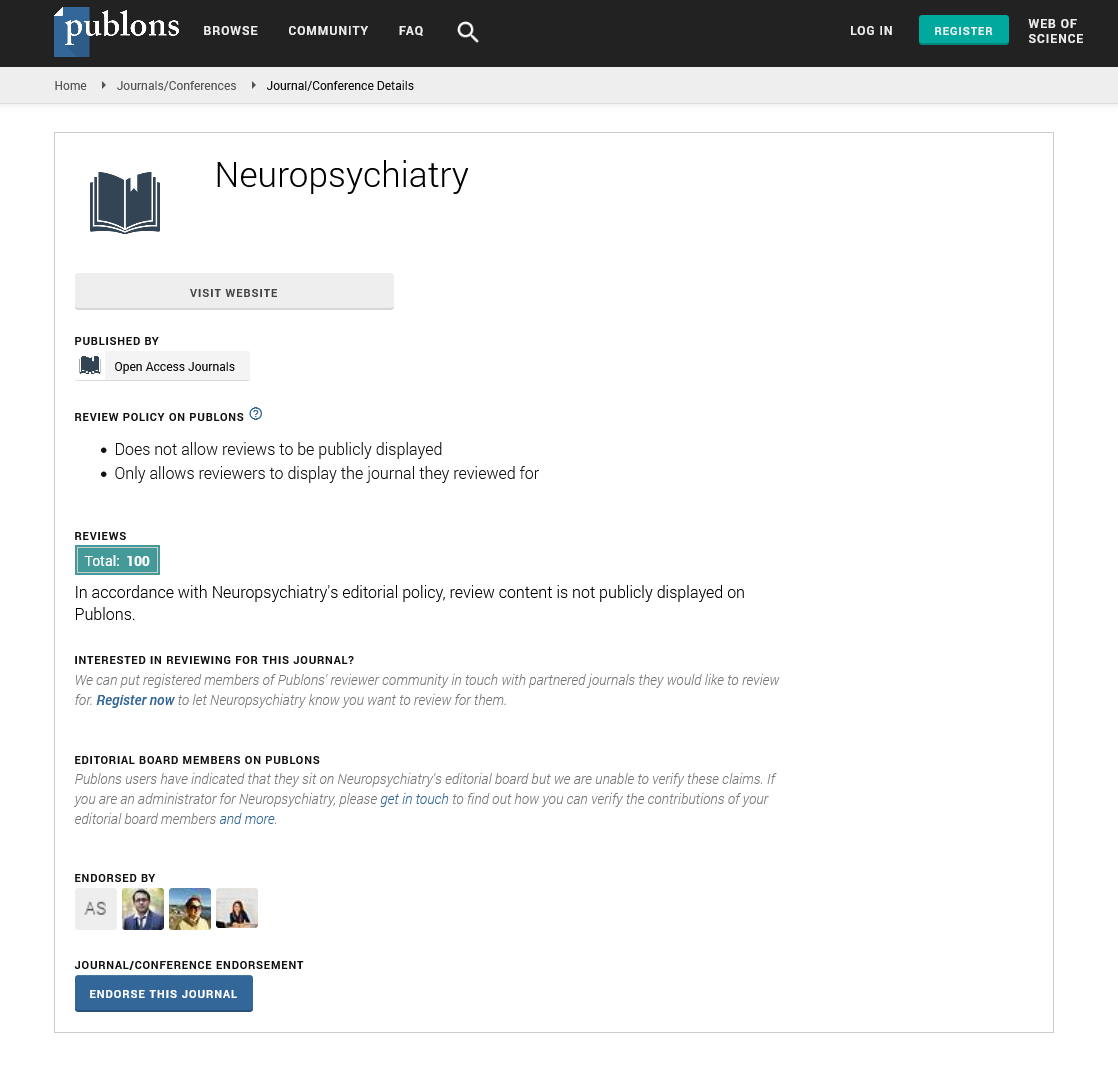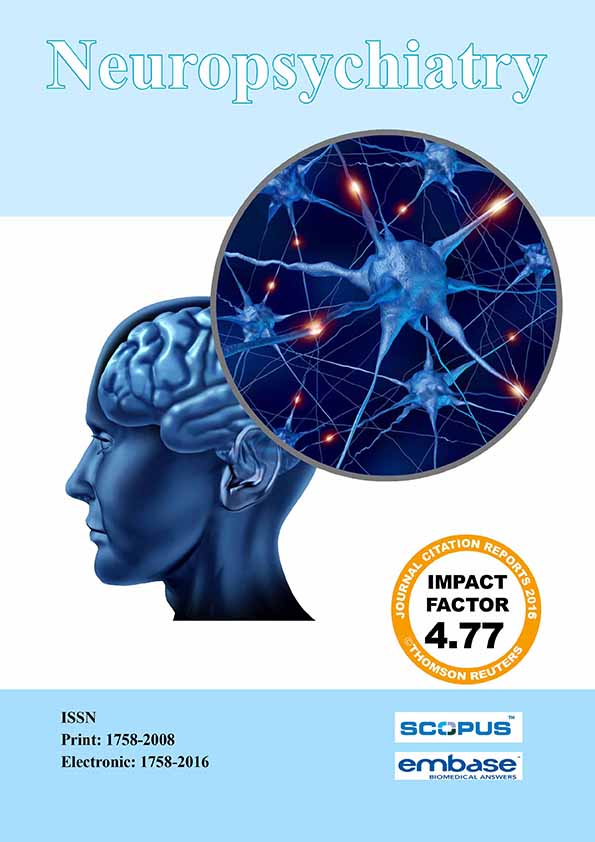Research Article - Neuropsychiatry (2017) Volume 7, Issue 6
Observation on Therapeutic Effect of Acupuncture Treatment on Cognitive Impairment after Mild Traumatic Brain Injury
- Corresponding Author:
- Ping Zheng
Department of Neurosurgery
Shanghai Pudong New area People’s Hospital
490 South Chuanhuan Road, 201299, Shanghai, China
Phone: +86-21-5898 1990
Abstract
Objective:
To observe the clinical efficacy of acupuncture on cognitive impairment after mild traumatic brain injury.
Methods:
Patients with cognitive impairment were randomly divided into a control group of 36 cases and 36 cases of acupuncture group. Both groups received donepezil hydrochloride treatment, and the acupuncture group received acupuncture treatment. Montreal Cognitive Assessment (MoCA) score was used to assess cognitive function before and after 4-week treatment in both groups.
Results:
Compared with before treatment, both groups showed increased MoCA score; In addition,TBI patients with acupuncture had more increased MoCA score compared to control group (P <0.05).
Conclusion:
Acupuncture can significantly improve cognitive function in patients with mild TBI.
Keywords
Acupuncture, Mild traumatic brain injury, Cognitive dysfunction
Introduction
Cognitive dysfunction is multiple damage, including sense of perception, attention, memory, language, thinking, consciousness and emotional disorders, and its occurrence is mainly due to traumatic brain injury (TBI) and social conditions [1]. At present, the medical treatment and rehabilitation for cognitive dysfunction is relatively limited, and patients are always becoming loss of confidence due to a long period of treatment, further resulting in a series of psychological disorders, which affects the effectiveness of rehabilitation and quality of life [2]. Recently, some studies report that acupuncture is able to improve cognitive function and neurological outcomes in elderly patients [3]. A systematic review by Chinese neurotrauma association demonstrated that no strong evidence is available to direct conventional treatment of cognitive dysfunction following TBI to support any clinical standards or protocols at this time and there is no targeted medicine for improving cognition in TBI as well [4]. Therefore, in this study, we investigated TBI patients with cognitive dysfunction in our hospital to apply the acupuncture for one month, and achieved satisfactory outcome.
Materials and Methods
▪ General information
We selected of 72 TBI patients with cognitive impairment assessed by MoCA in our hospital during the period from January 2013 to December 2015. The severity of TBI is classified according to Glassgow Coma Scale (GCS), mild head injury GCS13-15 points; moderate head injury GCS9-12 points; severe head injury GCS3-8. We included patients as follows: 1) Conformed TBI with the diagnosis by CT or MRI; 2) The measurement of cognitive function with MoCA scale; 3) Age 16-65 years old, with education level upper than junior school; 4) To sign the informed consent and cooperate with the completion of the test.
▪ We excluded patients with the followed criteria
1) Those with severe primary disease of liver, kidney, hematopoietic system, endocrine system and mental disorder history like anxiety, depression, mania, bipolar disease and schizophrenia; 2) Those with hearing impairment or other disabilities are not able to be measured by the scale.
▪ Grouping and treatment
72 patients were randomly divided into 36 patients in acupuncture treatment group and 36 cases in control group according to the random scale produced by the SAS software. Control group was given oral Citicoline Sodium Tablets 0.4 g oral, 3 times a day. Treatment period was 30 days and the treatment group was treated with acupuncture and Citicoline Sodium Tablets 0.4 g oral, 3 times a day Treatment period was 30 days as well. Electro-acupuncture acupoints: Baihui, Fengchi, Naohu point. Scalp needle, once every other day. Electric acupuncture frequency should be at 200 - 300 times/min, the intensity of stimulation is according to patient’s reaction. Both groups were evaluated with cognitive function using MoCA before treatment and three months after treatment.
Statistical Methods
We used SAS software to perform statistical analysis, P value < 0.05 will be regarded as the significant difference, P value is less than or equal to 0.01 will be regarded as highly significant difference. Data were expressed as mean±standard deviation, and two groups were compared with student’s t test.
Results
▪ Demographic comparison between the two groups
72 TBI patients were enrolled, and the comparison of characteristics of two groups was shown in Table 1.
| Group | Gender (Male/ Female) | Average age(years) | Cultural degree | Cognitive dysfunction | ||||
|---|---|---|---|---|---|---|---|---|
| Primary | Middle | Senior | Mild | Moderate | Severe | |||
| Control(n=36) | 16/20 | 43.51 ± 9.64 | 3 | 18 | 15 | 12 | 18 | 6 |
| Treatment(n=36) | 14/22 | 44.19 ± 8.25 | 4 | 16 | 16 | 10 | 21 | 5 |
There were no significant differences between the two groups at baseline (P>0.05) by the chi square test.
Table 1: Comparison of two groups at baseline.
▪ Cognitive evaluation between the two groups
MOCA was used to evaluate the cognitive function of patients, seen in Table 2. There was no significant difference between two groups before treatment. By student’s t test, compared with before treatment, MoCA scores were increased after treatment in both groups (P<0.01). Compared with the control group, MoCA score of the treatment group was statistically higher than that of the control group after the treatment (P<0.05), which indicates acupuncture treatment can significantly improve the cognitive function of patients. In addition, the acupuncture treatment could increase the MoCA in different fields in visual activity, memory, verbal and abstract ability, while there was an increased trend in other cognitive fields (Table 3).
| Group | Before treatment | After treatment |
|---|---|---|
| Control group(n=36) | 16.13 ± 3.25 | 19.66 ± 2.29** |
| Treatment group(n=36) | 14.19 ± 2.45 | 21.78 ± 2.06**,▲ |
Note: compared with before treatment, **P<0.01; compared with the control group, P<0.05▲.
Table 2: The MMSE score before and after treatment in the two groups (͞x ± s).
| MoCA Cognitive domain | Total score | Cognitive dysfunction group (n=86) | No cognitive dysfunction group (n=41) | P value |
|---|---|---|---|---|
| Visual activity | 5 | 2.89 ± 0.79 | 4.49 ± 0.75 | <0.01 |
| Name | 3 | 2.69 ± 0.48 | 2.86 ± 0.21 | >0.05 |
| Attention and computing power | 6 | 5.25 ± 0.56 | 5.57 ± 0.68 | >0.05 |
| language skills | 3 | 1.38 ± 0.36 | 2.29 ± 0.59 | <0.01 |
| Abstract ability | 2 | 0.68 ± 0.46 | 1.85 ± 0.36 | <0.01 |
| Delayed memory | 5 | 2.21 ± 0.63 | 3.81 ± 0.57 | <0.01 |
| Directional force | 6 | 5.53 ± 0.26 | 5.79 ± 0.18 | >0.05 |
Table 3: The MoCA scales before and after treatment in the two groups (͞x ± s).
▪ Safety issues
Multiple systematic reviews report acupuncture to be relatively safe when performed by qualified acupuncturists. Only minor side effects related to the local insertion of needles, such as transient redness, spot bleeding, minor bruising, and local discomfort, have been reported. In our study, we did not find obvious adverse effects regarding the blood, routine, liver and kidney function tests.
Discussion
Zheng, et al. reported improvement by only a small number of patients in all cognitive domains for patients with TBI followed up at 1 year; most patients showed no improvement declined [2]. Many studies have discussed the effect of acupuncture on impaired cognitive functions and the possible mechanism of acupuncture that leads to improved cognitive function in patients with TBI. McFadden et al. reported that acupuncture may improve event-related potentials (ERPs) and significantly increase the working memory function during acupuncture [5].
▪ Mechanism of acupuncture effect of cognitive impairment
Previous studies had shown the effect of acupuncture on acetylcholinesterase activity in the hippocampus. One study found that the acetylcholinesterase reactivity in the hippocampus of a chronic mild stress group of rats was significantly lower than that of the controls, and acupuncture at PC6 could increase the acetylcholinesterase reactivity in both hippocampal CA1 and CA3 in chronic mild stress group [6].
Neurotrophins, a class of growth factors, are a family of proteins that induce the survival, development, and function of neurons. Manni, et al. [7] found the isolated electroacupuncture group showed the lowest values of nerve growth factor in the striatum and hippocampus when compared to isolated control and non-isolated electroacupuncture groups [7]. Meanwhile, electroacupuncture could also help socially isolated mice to improve the delay of learning performances and electroacupuncture had a down regulation effect on brain-derived neurotrophic factor and nerve growth factor [7]. As for the brain-derived neurotrophic factor, Lee, et al. [8] observed the acupuncture significantly improved corticosteroneinduced cognitive impairment in rats via hippocampal mRNA expression of brainderived neurotrophic factor. These two studies suggested that brain-derived neurotrophic factor was affected in different cases of cognitive impairment. Applying acupuncture to different acupoints could help to normalize the brain-derived neurotrophic factor level by either up- or down-regulation [7,8].
Conclusions
In the present study, TBI patients were comprehensively treated by Western medicines and acupuncture, with MoCA scales used for detection. The preliminarily result shows that the comprehensive treatment of Western medicine and acupuncture is superior to medical treatment alone, and it can obviously improve cognitive function of patients with mild TBI.
Funding
The traditional medicine scientific funding of Shanghai Health Bureau: 2014LP049A
The Key subject building project of Shanghai Pudong New area Health Bureau: PWZz2013-13
References
- Zheng P, Tong W. IGF-1: An endogenous link between traumatic brain injury and AD? J. Neurosurg. Sci 61(4), 416-421 (2015).
- Zheng P, Tong W. Understanding the neurotransmitter changes underlying cognitive dysfunction in traumatic brain injury and possible therapeutic targets: a review. Arch. Med. Sci 11(3), 696-698 (2015).
- Huang J, Lin Z, Wang Q, et al. The effect of a therapeutic regimen of Traditional Chinese Medicine rehabilitation for post-stroke cognitive impairment: study protocol for a randomized controlled trial. Trials 16(1), 272-277 (2014).
- Jiang JY, Collaborators CHTS. Head trauma in China. Injury 44(11), 1453-1457 (2012).
- McFadden KL, Healy KM, Hoversten KP, et al. Efficacy of acupressure for non-pharmacological stress reduction in college students. Complement. Ther. Med 20(4), 175-182 (2012).
- Kim H, Park HJ, Shim HS, et al. The effects of acupuncture (PC6) on chronic mild stress-induced memory loss. Neurosci. Lett 488(3), 225-228 (2011).
- Manni L, Aloe L, Fiore M. Changes in cognition induced by social isolation in the mouse are restored by electro-acupuncture. Physiol. Behav 98(5), 537-542 (2009).
- Lee B, Sur BJ, Kwon S, et al. Acupuncture stimulation alleviates corticosterone-induced impairments of spatial memory and cholinergic neurons in rats. Evid. Based. Complement. Alternat. Med 2012(1), 670536 (2012).


